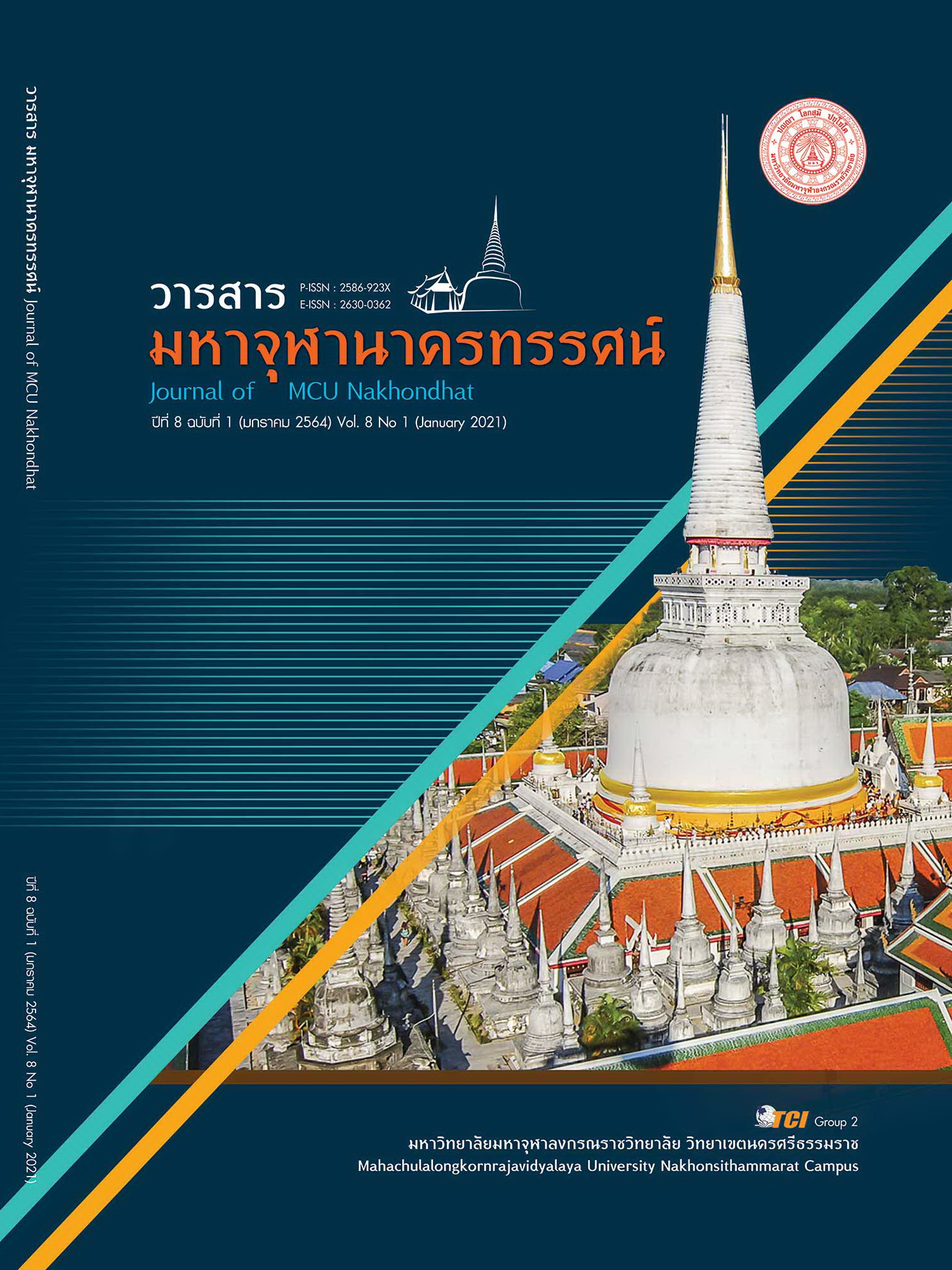THE EFFECTS OF ACTIVITY - BASED LEARNING AND METACOGNITIVE ACTIVITIES ON MATHEMATICAL REASONING ABILITY OF MATHAYOMSUKSA III STUDENTS ON PROBABILITY
Main Article Content
Abstract
The Objectives of this research article were to study the effects of activity - based learning and metacognitive activities on mathematical reasoning ability of probability of Mathayomsuksa III students. The sample was 35 Mathayomsuksa III, Prainsuksa Klomsakul U - tid School students in the second semester of the academic year 2019. They were randomly selected by using cluster random sampling, one classroom of four classrooms. The instruments were 11 lesson plans on activity - based learning and metacognitive activities on probability, and the Mathematical reasoning Ability Test on probability. The data were statistically analyzed by using percentage, mean, standard deviation and one sample T - Test. The result revealed that mathematical reasoning ability of Mathayomsuksa III students on probability using active - based learning and metacognitive activities was higher than the determined criterion 70 percent of the total scores with statistically significant at .05 level. Afterward, we using activity - based learning and metacognitive activities, Students have score average for mathematical reasoning was 15.14 or 75.70%. Passed the criteria 70 percent of 26 people or 74.29 % and did not meet the criteria of 9 people or 25.71 %.
Article Details
References
พรรณทิภา ทองนวล. (2554). ผลการจัดการเรียนรู้อย่างมีชีวิตชีวาโดยเน้นการใช้ตัวแทนที่มีต่อผลสัมฤทธิ์ทางการเรียนความสามารถในการให้เหตุและความสามารถในการสื่อสารทางคณิตศาสตร์ เรื่อง ความสัมพันธ์และฟังก์ชันของนักเรียนชั้นมัธยมศึกษาปีที่ 4. ใน วิทยานิพนธ์การศึกษามหาบัณฑิต สาขาวิชาการมัธยมศึกษา. มหาวิทยาลัยศรีนครินทรวิโรฒ.
สถาบันส่งเสริมการสอนวิทยาศาสตร์และเทคโนโลยี. (2555). การวัดผลประเมินผลคณิตศาสตร์. กรุงเทพมหานคร: ซีเอ็ดยูเคชัน.
. (2556). Metacognition. เรียกใช้เมื่อ 5 มกราคม 2563 จาก http://sa.ipst.ac.th/wcontent/ uploads/sites/7/2014/08/03.กระบวนการพัฒนาข้อสอบวัด-Metacognition.pdf
. (2559). สรุปผลการวิจัยโครงการ TIMSS 2015. กรุงเทพมหานคร: โรงพิมพ์คุรุสภาลาดพร้าว.
สถาพร พฤฑฒิกุล. (2555). คุณภาพผู้เรียน...เกิดจากกระบวนการเรียนรู้ Quality of Students Derived from ActiveLearning Process. วารสารการบริหารการศึกษา มหาวิทยาลัยบูรพา, 6(2), 1-13.
สิโรตม์ บุญเลิศ. (2555). ผลการใช้รูปแบบการเรียนการสอน 5E ร่วมกับกลวิธีการสะท้อนอภิปัญญาที่มีต่อผลสัมฤทธิ์ทางการเรียน มโนมติทางวิทยาศาสตร์ และอภิปัญญาของนักเรียนชั้นมัธยมศึกษาตอนปลาย. ใน วิทยานิพนธ์การศึกษามหาบัณฑิต สาขาวิชาหลักสูตรและการสอน. มหาวิทยาลัยทักษิณ. โรงพิมพ์แห่งจุฬาลงกรณ์มหาวิทยาลัย.
อัมพร ม้าคนอง. (2554). ทักษะและกระบวนการทางคณิตศาสตร์: การพัฒนาเพื่อพัฒนาการ . กรุงเทพมหานคร: โรงพิมพ์แห่งจุฬาลงกรณ์มหาวิทยาลัย.
Baker, L. & Brown, A. L. (1984). Cognitive Monitoring in Reading. Newark: Delaware International Reading Association.
Collins, J. W. & O’Brien, N. P. (2003). The Greenwood Dictionary of Education. Westport. Retrieved 27 March 2003 from CT: Greenwood Press. Run on February 29, 2019 from: http://twitmails3.s3-website-eu-west-1.amazonaws. com/users/355757832/16/attachment/_ JV1lIiEbdy%20%20%D9%85%D8%B1%D8%AC%D8%B9%20%D8%A7%D8%AC%D9%86%D8%A8%D9%8A.pdf
Montague, M. (1992). The Effects of Cognitive and Metacognitive Strategy Instruction on the Mathematical Problem Solving of Middle School Students with Learning Disabilities. Journal of Learning Disabilities, 25(4), 230-248.
National Council of Teacher of Mathematics (NCTM) . (2000). Principles and Standardsfor School Mathematics . Reston, VA: National Council of Teacher of Mathematics.


